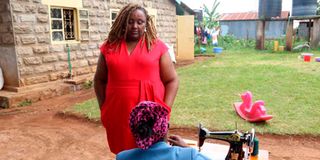Usikimye partners with city hotel in anti-SGBV feeding programme

Usikimye co-founder Njeri Migwi (in red) with a GBV survivor at one of their safe houses. Her organisation has partnered with a Nairobi hotel to strengthen their feeding program in the sprawling slum of Kayole.
What you need to know:
- Usikimye, an organisation that works to end SGBV has partnered with Movenpick Hotel to strengthen their feeding program in Nairobi's Kayole.
- The feeding program which has been running for the past three years, is among their strategies to prevent SGBV in slums.
Usikimye, an organisation that works to end sexual and gender-based violence (SGBV) has partnered with Movenpick Hotel to strengthen their feeding programme in the sprawling slum of Kayole.
The collaboration, which began last Friday, will enable Usikimye to offer an extra feeding day to 700 children and a few pregnant and elderly women up from their usual four times a week.
According to Njeri Migwi, the founder of Usikimye, the feeding programme, which has been running for the past three years, is among their strategies to prevent SGBV in slums.
Domestic violence
“Many children in slums are preyed on simply because they are hungry. You will find that a child was lured by an abuser with a chapati or chips,” she said.
“We have also found out that when both the father and mother are unable to find work and return home to hungry children, it usually triggers domestic violence.”
Tuesdays and Thursdays are reserved for nutritional porridge while lunch is served on Wednesdays and Fridays.
On Saturdays when the organisation runs its mobile library, the children get special treats of juice, biscuits and other snacks.
And while this may look normal to most, Ms Migwi says it makes the whole difference between a child who will fall victim to a predator because of foodstuffs that appear beyond his or her reach, and one who will not.
Private schools
Movenpick’s marketing and communication’s manager Randy Ngala, said the initiative was a part of their sustainable corporate social responsibility activities.
“We will provide food that is actually served to our guests but is left in our trays and all the other extra food we have,” he explained.
“This is a noble cause that can be replicated by other hotels because we do have a lot of good food that ends up in the dump but can instead be used by those who need it.”
Mr Ngala was confident that the programme would run for as long as the hotel remains operational.
To identify beneficiaries, the organisation works closely with teachers who are mostly from low-cost private schools because there are few public schools available.
The programme consequently allows parents to save on lunch money and instead redirect it towards school fees.
To prevent parents from being aid-dependent, the organisation also works with the mothers of the beneficiaries.
They have different chamas where the women are taught financial literacy skills and are able to save as little as Sh50. With the savings, the women can access loans to start small business like soap making, which Usikimye helps them to market.





